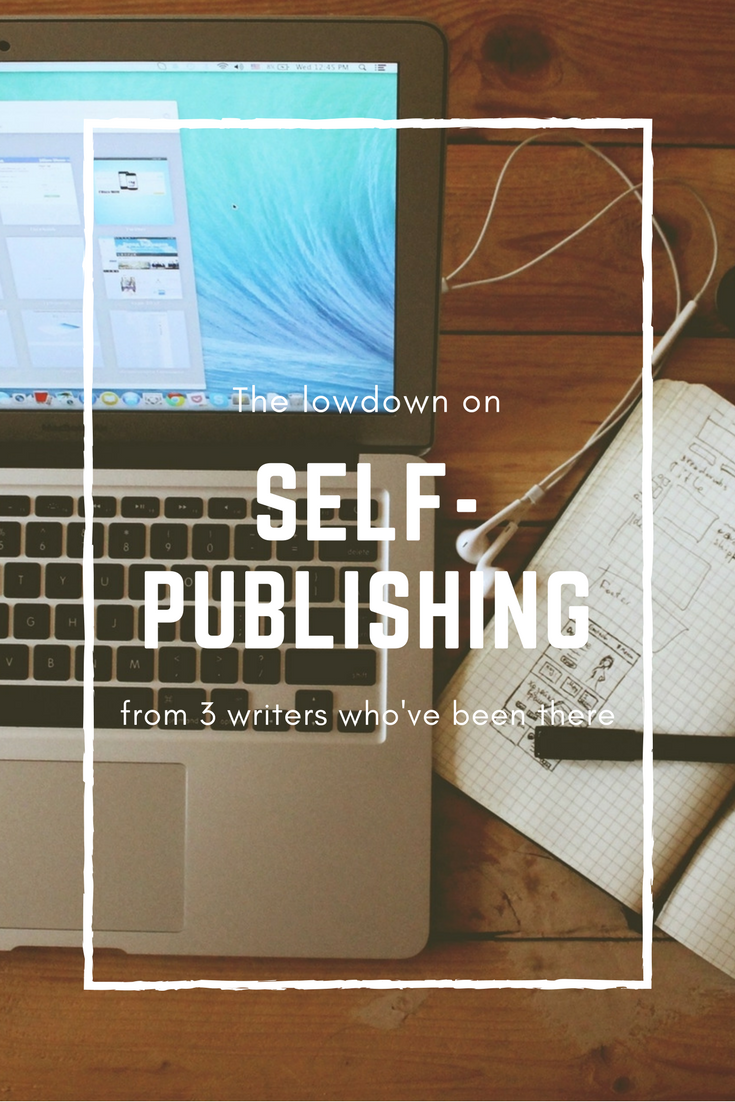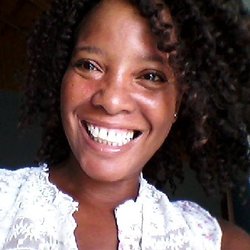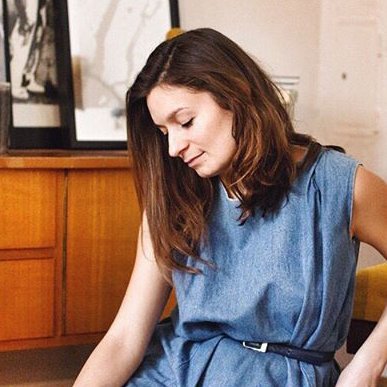From manuscript to market
Self-publishing is a way for writers who are either immobilized by the traditional publishing process or thwarted by constant rejection to gain readers. (P.S. Constant rejection does not mean you aren't a talented writer; it means your work simply isn't the right fit for that literary agent or publishing house. And we all deserve to build relationships with people who love and appreciate what we have to offer, right?)
When we think about self-publishing, we tend to think of an ebook brought to the masses (one hopes!) via Amazon’s Kindle Direct Publishing service. Yet there are other ways to make it onto e-readers, and those routes don’t have to break the bank.
In fact, many writers choose to self-publish specifically for financial reasons: Without a literary agent, publishing house, marketer, etc. getting a portion of sales, that majority of royalties goes to Y-O-U. When I experimented with self-publishing in 2015, the effort followed a magazine article I’d read that profiled an author of erotica who said she made $60,000 a month from self-published work.
You guys. $60,000 a month.
There are benefits to self-publishing that go beyond cash money, though, and I picked the brains of three self-published authors to learn the ins and outs. Meet and learn from them below!
Monika Kanokova is a freelance community and content strategist who writes books for freelance creatives.
Douglas Humphries is an author and the moderator of the weekly Twitter chat #CreateLounge.
Yuwanda Black writes fiction and non-fiction ebooks, creates and teaches e-courses and blogs at Inkwell Editorial.
How did you make the decision to self-publish instead of going the traditional publishing route?
It never occurred to me to go the traditional route because I worked in publishing in NYC for a decade. I knew how hard it was to get a traditional book contract. I also knew how little it paid -- unless you’re a big-name author, like Stephen King or Alice Walker.
Besides, I’ve always been kind of a control freak. I like doing things my way, on my own time. It’s one of the main reasons I freelance.
I knew self-publishing was an option but one I never seriously considered and hadn’t really researched until I met Kayla Hollatz. She had just self-published her first poetry collection Brave Little Bones through Lulu Press. I was able to pick her brain about the process and discovered that not only could I self-publish easily, but I could do it with no money upfront, thanks to on-demand printing.
Self-publishing Fire in My Bones made sense for a lot of reasons: The book itself is hard to pin down genre-wise. It’s part memoir, part scriptural analysis, part roadmap to depression and it’s less than 100 pages — all of which would have made it hard to sell to a publishing house. It’s also a deeply personal project. I knew if I tried to take it the traditional route, that would mean months, or quite possibly years, of sending it out, getting rejected and ultimately having to change it significantly in order to make it publishable. Self-publishing allowed me to maintain control over the shape of my book and publish it in a relatively short amount of time.
When I first decided to self-publish I didn’t really see it as such a big thing. I went freelance more or less spontaneously, and I needed to research for myself how to best do it.
I hired an editor, and I also decided to hire an illustrator. Then the illustrator was delayed, and because I had already decided on a title, This Year Will Be Different, I had (!) to publish in the first week of January. I then improvised, launched a Kickstarter and the rest is history. I’m now about to publish a third guide for creative freelancers, and I’m also already conceptualizing a fourth book.
How does your editing process look prior to self-publishing? (For example, do you edit your draft 55 times before hiring an outside editor?)
No, I don’t — and you'll never get anything published if you’re obsessive like that, in my opinion.
I do most of my own editing, copyediting and proofreading. I don’t advise it, though; the reason I do it is that I’m usually on a schedule and don’t have time to wait for a proofer/editor to fit my book in. Also, I tend to edit while I proof, so that’s another part of the reason.
I’m getting much more meticulous about this, as some of the harshest reviews on my early romance novellas were grammar/spelling-related. And of course you can’t delete Amazon reviews, so even though I’ve gone back in and reproofed and edited most of my novellas (the best-selling ones), those early reviews stay there. So I learned my lesson. Nowadays, I leave two days for this: one for doing a final edit then another day for straight proofing. It’s paid off in that I no longer get those kind of reviews, thank goodness!
Because it’s all non-fiction, I have a structure even before I start writing. I always make sure to provide a lot of value in each article. Then my editor and I work in tandem. Once we have the full draft, we go over it, and my briefing to her is to strip the script off anything unnecessary.
Our process is something like this: I conduct a number of interviews. That’s always my starting point. I transcribe them all, which gives me a chance to fully immerse myself in the content. I edit, and then the interviewees get to approve how I edited what they said. I edit all conversations heavily to maximize the value for the reader, and thus it’s important for me the interviewees are on board with what I turned their words into. Then I send all interviews to my editor, and, simultaneously, I develop a storyline and decide on the remaining chapters I want to add to the book. Then I send every chapter to my editor to ask her if it’s all bullshit or if we can keep it like that or if I need to add something.
Once we have the entire manuscript, we go over it in tandem two or three times before we send it over to the designer. Then we edit one or two more times while it’s already laid out to make sure it’s all solid, without any typos or spelling mistakes. The process is quite manic, but it’s been good!
For my book, I actually didn’t hire an outside editor. What little money I had was devoted to my cover designer, and that ended up being the one element of my book I actually paid for out-of-pocket. I did, however, get some outside help. After doing several passes of the book myself, I handed it off to some of my friends who are writers themselves. I was mostly looking for their opinions on the material: Did the book make sense? Did the formatting work? Would someone actually want to buy and/or read it? But in addition to that, many of them were also happy to point out grammar and spelling errors I had missed.
I would recommend that writers get an outside editor — preferably a professional, but even if you can't afford that, at least someone to look over and give you an honest opinion on it. It's vital for your book.
What are the pluses and minuses of not having a literary agent?
The plus and minus of not having an agent or a book deal are the same: The plus is: it’s all on you. The minus is: it’s all on you.
Self-publishing allows you to maintain a level of control on your project that you would never have in traditional publishing, especially as a first-time author. You can choose the content, the layout, the cover art — everything. If you want to hire out for any of these elements, like I did for my cover art, you can, or you can just as easily do it yourself. Of course, depending on your talent in those areas, that might mean that a part of your book, like the cover or the formatting, might not look as good as the rest of the book.
The other tradeoff is that you also are responsible for everything after the book is published: marketing, promotions and all that other stuff, which is vital if you want your book to actually sell. This is why a lot of authors might prefer the traditional route, even though it is very hard to break into. Part of a book deal typically includes some level of promotion, such as press releases. An agent would also be responsible for booking your events and so on, and, since they are in the industry, they would have contacts and influence that an author, by themselves, might not. This particularly comes into play when you are trying to get your book into bookstores. Online sellers are fairly easy, but brick-and-mortar stores typically only buy from clearing houses or known agents.
What can you tell me about the work involved in the publication process that writers considering self-publishing might not anticipate (like formatting and cover art)?
For cover art, I’ll either do it myself if it’s a simple cover, or hire someone from Fiverr to create one if it’s a bit more complicated, e.g., if it requires Photoshop, a skill I don’t have and have no desire to learn. Even this is easy, though, compared to marketing, which is where the real work of self-publishing comes in.
You have to constantly be on the marketing grind. I keep it pretty simple because I believe that your best marketing is always your next book.
Formatting and cover art are probably the two biggest aspects that first-time authors would not be prepared for when going into self-publishing. First-time authors also ask about things like copywriting and how to get an ISBN, but those are fairly simple and easy to get. Formatting, though, gave me a headache. For a printed book, it’s mostly about making sure the margins match the printing size and then going through with the Microsoft Word equivalent of a fine-toothed comb to make sure the chapters have page breaks and all of the line spacing is consistent.
For ebook publishing, though, formatting can make or break a book. Literally. Formatting is how the software tells what in your book is a chapter and what isn’t so it can be searchable and have a table of contents. If you don’t get the formatting just right, the software won’t work. For most self-publishing sites, if your manuscript is not formatted correctly, if will be rejected for publication.
Cover art is not so much hard to get as hard to get right. You can do it yourself. Lulu, the site I worked with, has a widget that will let you design your own, mostly with different fonts and clip art. There is also online photo manipulation software, like Canva or Pixlr, that you can use, but, again, how good the finished product ends up being depends on your skill. I had a specific idea for the cover of my book and realized from the beginning that I couldn’t do it myself and get it to look as good as I wanted it to. Thus, I decided to hire a cover artist and was absolutely blessed to be connected with Allison Barclay of Painted Summers, who took my idea and made it so much better than I could have expected. Authors should be aware that if they want good work, they have to pay good money.
Monika, what can you tell me about the publication process for Work Trips and Road Trips, and why Kickstarter?
Now I know it’s the best way to involve people in the process even before the book is finished. Also, for a self-published author, it's the best way to market a book. A lot of my Kickstarter backers post a photo on their social media. They've been waiting for this moment for as long as you have, and so they are at least as excited as you are it’s finally finished and in their hands!
Kickstarter also helps to break the mental barrier between you, the anonymous writer, and the reader. I love getting emails and hearing from the people who’ve read my books!
What should other writers know about self-publishing?
Write more fiction instead of non-fiction, if you’re doing both. These books don’t have to be updated, and they can earn you money on autopilot forever. This is something I wished I’d realized when I first started self-publishing.
That they should make it with great effort to not to screw up the industry. Self-publishing has a funny reputation. While the act of self-publishing is fairly easy, one should make it with great care and hire an illustrator and designer. I also hire an illustrator because I see the added value of having enough visuals for me to be able to communicate about my book without repeating myself all the time.
For me, self-publishing these books is a hobby. As Joanna Penn, a well-known self-publisher who I interviewed for my second book, My Creative (Side) Business, said to me, Stephen King can only live from his books because he’s written 20. That put things in perspective for me. The margins on books are tiny, and so I’d never expect to make such crazy amounts from it. The majority of published books in the United States sell 250 times. Not every book becomes a bestseller, and one should account for that, in my opinion.
How would you break down the percentages of your work life (for example: 25% writing my books, 35% freelance writing for other publications and 40% marketing myself)?
About 90 percent of my time is spent on my own projects these days — mainly developing e-courses and writing fiction (romance novellas). I started working on this back in 2011, when I spent that entire year writing and uploading 50 ebooks to Amazon.
Nowadays, I only take on freelance writing projects from long-time clients that I enjoy working with and/or from new ones who don’t quibble about rate.
Right now, I have a day job, which is probably true for a lot of other first-time and self-published authors. That takes up a lot of my time, but I do try to be intentional with the rest of my time so that I can still pursue my creative projects.
I’d say about 40% of my time, as a creative, is taken up by whatever my current major project is. It usually takes center stage for my creative energies. If I’m not actively writing on it, I’m thinking or brainstorming about it.
25% of my time is taken up by other writing. This includes writing on my blog every week as well as any other writing, whether it’s contributing to another blog, another project I’m working on or client work.
20% is taken up by CreateLounge. I’m still working on this sector and am anticipating it taking a great chunk of my time in the future, but thinking up and running the chats every week, as well as brainstorming what to do next, takes up about this much of my free time.
15% is taken up by social media management. I manage the social media for a client as well as my own and CreateLounge’s. I recently invested in a Hootsuite membership to manage all of these together and am building a strategy for each. This percentage would also include any marketing I do for my book, which I’m sad to say has fallen down a bit with other projects taking my time, but which I am still feeling out a proper strategy for.
You might also be interested in:
Thinking about using an editor before self-publishing your work?
I'm glad to chat!
Click here to learn more about how the writer-editor relationship looks and here to check out the services I offer to writers like you.


















